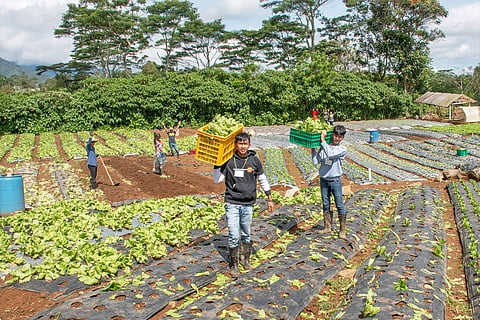
- NEWS
- the EDIT
- COMMENTARY
- BUSINESS
- LIFE
- SHOW
- ACTION
- GLOBAL GOALS
- SNAPS
- DYARYO TIRADA
- MORE

Six persons deprived of liberty (PDLs) from Davao Prison and Penal Farm have earned their college degrees on Monday, proving that incarceration is no hindrance to education.
Through the College Education Behind Bars, a government, nongovernment organization, and state universities and colleges partnership program, PDLs were allowed to acquire tertiary education for free from Davao del Norte State College.
“Our PDLs have violated the law and they are deprived of their liberty but not of their fundamental rights, including your right to receive education,” CHED chairperson Prospero de Vera III said during his commencement address.
"Like over two million Filipino youth abroad, through the CEBB, PDLs were given the opportunity to study and graduate from college for free. They are also beneficiaries of Republic Act 10931 or the Free Universal Access to Quality Tertiary Education Act,” De Vera added in Filipino.
CEBB is the first of its kind in the Philippines and in Asia to provide a college education and to construct a physical college building inside the jail.
It is a product of the partnership among SUCs, the Social Entrepreneurship, Technology, and Business Institute, the Bureau of Jail Management and Penology in Region XI, the Dangerous Drug Board, the Bureau of Corrections, and the support of the local government of Davao.
“One way to reduce the cycle of incarceration and recidivism is through education and job training. We believe that investing in human resources no matter who they are or where they come from is the best investment to make,” SETBI president and founder Aland David Mizell said.
"Because of the support and nurturing from various government branches and SETBI, the PDLs gained the capability and confidence needed to reintegrate into society,” Supreme Court Associate Justice Jose Midas Marquez said.
The University of Southeastern Philippines was the first SUC to deliver the CEBB Program in the Davao City Jail in 2017 and was replicated by DNSC to facilitate college education at Davao Prison and Penal Farm.
“I encourage USeP and DNSC to document their delivery of the CEBB program in order to encourage other HEIs across the country to replicate and launch similar initiatives in their respective localities. We need to have more of this to ensure that in our education mission no one Filipino is left behind,” De Vera said.
Currently, the program has produced more than 88 graduates and more than 157 students are going to enroll in the CEBB programs for the 2024-2025 school year.
